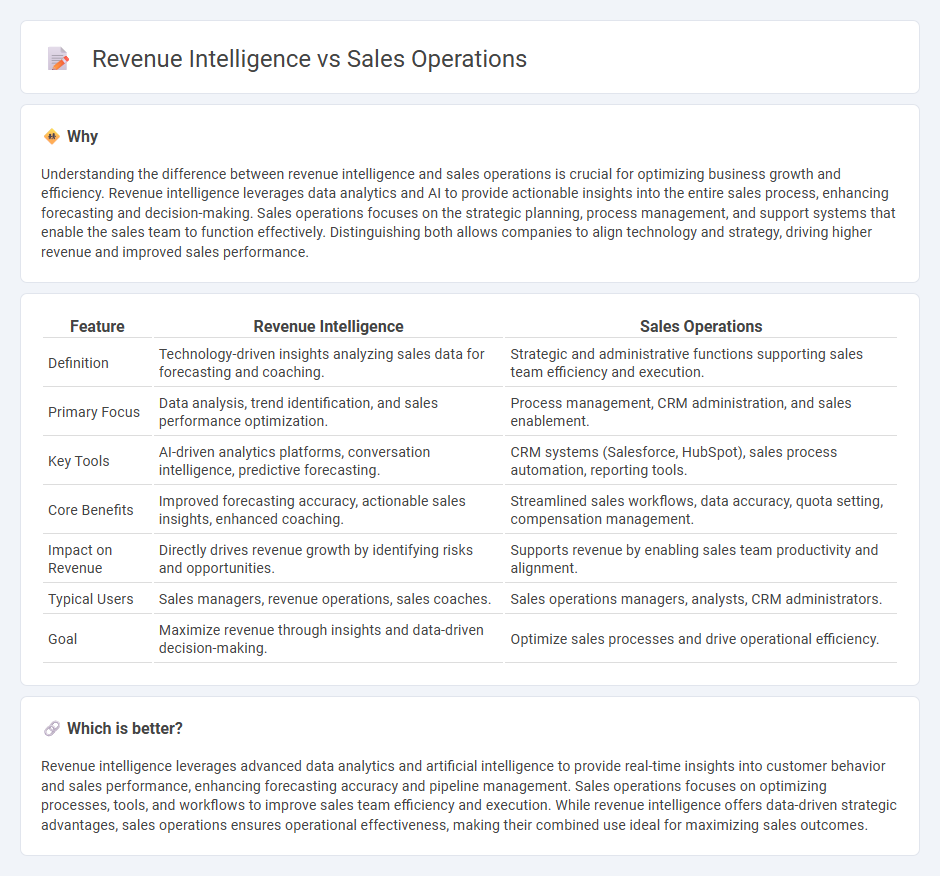
Revenue intelligence leverages AI and data analytics to provide real-time insights and predictive forecasting, enhancing decision-making and sales performance. Sales operations focuses on streamlining processes, managing CRM systems, and ensuring efficient resource allocation to support the sales team. Discover how integrating revenue intelligence with sales operations can drive superior business outcomes.
Why it is important
Understanding the difference between revenue intelligence and sales operations is crucial for optimizing business growth and efficiency. Revenue intelligence leverages data analytics and AI to provide actionable insights into the entire sales process, enhancing forecasting and decision-making. Sales operations focuses on the strategic planning, process management, and support systems that enable the sales team to function effectively. Distinguishing both allows companies to align technology and strategy, driving higher revenue and improved sales performance.
Comparison Table
| Feature | Revenue Intelligence | Sales Operations |
|---|---|---|
| Definition | Technology-driven insights analyzing sales data for forecasting and coaching. | Strategic and administrative functions supporting sales team efficiency and execution. |
| Primary Focus | Data analysis, trend identification, and sales performance optimization. | Process management, CRM administration, and sales enablement. |
| Key Tools | AI-driven analytics platforms, conversation intelligence, predictive forecasting. | CRM systems (Salesforce, HubSpot), sales process automation, reporting tools. |
| Core Benefits | Improved forecasting accuracy, actionable sales insights, enhanced coaching. | Streamlined sales workflows, data accuracy, quota setting, compensation management. |
| Impact on Revenue | Directly drives revenue growth by identifying risks and opportunities. | Supports revenue by enabling sales team productivity and alignment. |
| Typical Users | Sales managers, revenue operations, sales coaches. | Sales operations managers, analysts, CRM administrators. |
| Goal | Maximize revenue through insights and data-driven decision-making. | Optimize sales processes and drive operational efficiency. |
Which is better?
Revenue intelligence leverages advanced data analytics and artificial intelligence to provide real-time insights into customer behavior and sales performance, enhancing forecasting accuracy and pipeline management. Sales operations focuses on optimizing processes, tools, and workflows to improve sales team efficiency and execution. While revenue intelligence offers data-driven strategic advantages, sales operations ensures operational effectiveness, making their combined use ideal for maximizing sales outcomes.
Connection
Revenue intelligence leverages data analytics, artificial intelligence, and CRM integration to provide actionable insights that enhance sales forecasting, pipeline management, and deal acceleration. Sales operations utilize these insights to streamline processes, optimize resource allocation, and improve sales team productivity by aligning strategies with real-time revenue data. This symbiotic relationship enhances decision-making accuracy and drives higher sales performance and revenue growth.
Key Terms
Sales Operations:
Sales Operations streamlines sales processes, manages CRM data, and optimizes sales team performance to boost productivity and drive consistent revenue growth. It focuses on forecasting accuracy, territory alignment, and sales enablement tools, ensuring efficient sales execution and improved decision-making. Explore how Sales Operations can transform your revenue strategy for maximum impact.
Process Optimization
Sales operations centers on process optimization by streamlining workflows, managing CRM systems, and improving sales team efficiency to boost overall performance. Revenue intelligence utilizes data analytics and AI to provide actionable insights into customer interactions, forecast revenue trends, and identify growth opportunities. Explore deeper to understand how integrating both can transform your sales strategy.
Sales Enablement
Sales operations streamline processes, manage data, and optimize tools to enhance sales team efficiency, while revenue intelligence analyzes customer interactions and sales activities to extract actionable insights for driving growth. Both functions support sales enablement by improving team performance and aligning strategies with revenue goals. Explore how integrating sales operations with revenue intelligence empowers sales enablement to boost pipeline accuracy and close rates.
Source and External Links
Sales operations - Wikipedia - Sales operations is a set of business activities and processes that help a sales organization run effectively and efficiently in support of business strategies, including sales enablement, business analytics, sales administration, attainment planning, and operations design.
Sales Operations (Sales Ops) - DealHub - Sales operations drives revenue by enhancing sales team efficiency through training, process improvement, data analysis for forecasting, and cross-functional collaboration with marketing, finance, and product teams to align sales strategy.
Sales Operations: The Ultimate Guide [2025] - Mailshake - Sales operations oversees and coordinates sales team activities by developing processes, analyzing data, managing CRM systems, and optimizing sales team performance through strategy and workflow automation.
 dowidth.com
dowidth.com